6/22/2006
Ever heard of integration?
And next week Hidde and I will be on vacation in Andalucia, so see you later...

Hé doos, nooit van integreren gehoord?
6/16/2006
Fear / hate / criticism
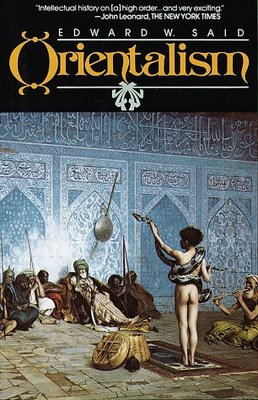 Here's another text I posted on Orkut. There had been many discussions about the meaning of "Islamophobia".
Here's another text I posted on Orkut. There had been many discussions about the meaning of "Islamophobia".
In the other discussions it was said that Islamophobia is often labelled on to people incorrectly, that people are labelled like that who are not afraid of the Islam. It's always easy to label anyone who says something negative about the Islam as Islamophobe and then the discussion is over.
I think that when somebody says something negative about the Islam, there are three possibilities:
1. The person wants to criticize (certain aspects of) the Islam
2. The person is afraid of the Islam
3. The person dislikes or hates the Islam
Only nr. 2 is Islamophobe (and different combinations of the numbers are possible as well). We cannot know for sure what the motives are for why somebody says something. But I think that there are some indications which point to nr. 1,2, and 3.
E.g. nr. 1 will be more neutral and rational in his reactions than the fearer and the hater, who tend to become emotional fast.
And somebody who only criticizes certain aspects of the Islam can have many Muslim friends. If you don't support an aggressive Jihad or stoning women to death, you can be friends with Muslims who don't support that either (and there are many). Someone who hates the Islam can be friends with Muslims as well. The hate can be against something abstract, an ideology, not towards individuals, or not all individual Muslims but just "bad" ones. With fear it is much more difficult. The fear is also abstract, but each individual you meet give an impulse to the feeling of fear. When you are afraid you start to think that every Muslim you meet might be a terrorist.
People who fear and/or hate tend to exaggerate, they blow things out of proportion. While the neutral criticizer can point out exactly what he means without making generalizations and without blowing it up.
Hirsi Ali expects totalitarian Muslims to become the majority / gain power in Europe in 2030 the latest. At this moment 5,7% (highest estimation) of the European population consist of Muslims. Only about 1 percent of the total population has got fundamentalist views (who don't all of them support violence and a totalitarian system). Muslims have to get an incredible amount of children or gain a tremendous amount of converts if they want to reach more than 50%, or at least enough to commit a coupe in Europe as a whole, to make Hirsi Ali's prediction come true.
It's a phenomenon that I have seen a lot in the Netherlands, that natives think that the Netherlands can come under Muslim rule anytime now. That when terrorist summon "normal" Muslims they will obey immediately, all of them, and that she Sharia will be introduced and that natives will live as Dhimmi's.
And then a comparison is made with the people who didn't resist in the Second World war, who pretended that nothing was wrong. We should no longer deny the facts but take action and start a confrontation with Muslims, the great evil and danger had to be stopped immediately. If Muslims don't show that they can be trusted for 200% to support the democracy and to be as civilized as "us", they have to be kicked out of the country immediately.
So this could be a nr. 2 argumentation.
The hater is not so afraid that Europe will become Islamic soon. The hater is not afraid but just angry and he will resist hard if attempts for Islamification would be made. But the hater exaggerates as well. If the Islam is an apple with a rotten spot: extremism (by terrorists and totalitarian regimes), the hater considers the whole apple to be rotten. The Quran is rotten, the Prophet is rotten (psychopath and paedophile) and Muslims are rotten, unless they decide not to follow the Quran and the Prophet (what kind of a Muslim is that).
Individual Muslims can still be normal and friendly but then it's still a pity that they haven't discovered the rotten nature of the Islam yet.
So both the one who is afraid and the one who hates, exaggerate the problem. They see the Islam as an enormous monster that should be killed.Then they start to fight against the Islam as a whole.This while the criticizer and me, we see the Islam as a tasty good apple with a small rotten spot. The criticizer will try to cut the rotten spot out of the apple, he doesn't throw away the whole apple. The criticizer can also be a Muslim himself.Fear and hate lead to generalizations and exaggerations. They lead to the prejudice that Muslims are violent and can not be trusted. It leads to discrimination and racism.And it leads to the conclusion that a common future between Muslims and non-Muslims in a multicultural society is not possible. It leads to "us" vs "them" sentiments. "We" are completely good and "they" are completely evil. They will be excluded from our society, unless they proof that they behave just as good as us, despite them being Muslims.From the other side the protest and violence will increase when they are being excluded and treated like dirt unless they assimilate completely. Their willingness to integrate will decrease then. So fear and hate are bad for the society, while precise and nuanced criticism towards certain practices in name of the Islam can help to counteract these practices.
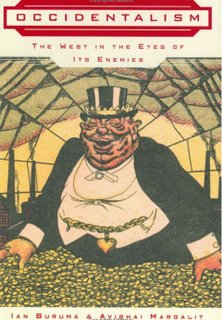 And here’s something I wrote later in the discussion:
And here’s something I wrote later in the discussion:The fearers and especially the haters "on the other side" have much in common with the nr. 2 and 3 I described.
Common characteristics:
So the people who overreacted to the Danish cartoons are the West-haters. They see the West as a whole as an enormous monster that should be killed.
6/14/2006
The Story of Don Quichote and Strawberry
http://home.tiscali.nl/estherhidde/story.htm
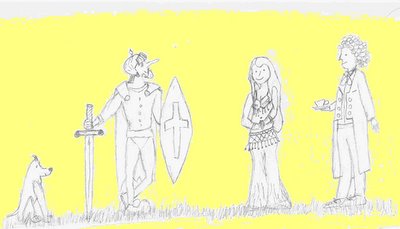
Some quotes from my Orkut scrapbook (posted last week of August 2005) which formed the main inspiration for this cartoon:
- Crazy Conservative Clown talking to Strawberry: “No slutty Arab belly dancer can ever cut my throat”.
- Crazy Conservative Clown to Es Khan the Lunatic Liberal: “Sad part is they will not distinguish between you and I when they wanna cut our throats to make Allah happy, unless you convert to Islam and start becoming a subhuman, which is how Islam views a woman; a sub-human.”
- Es Khan and Mad Hippy the 2nd were accused of establishing an “unholy alliance between the radical lunatic left and the racist Islamo-fascist”.
- The Crazy Conservative Clown also said about the Mad Hippy to Es:
“I wonder if Mad Hippy is busy in his damp and cold apartment in western Europe planning another terrorist attack like those of London to blow up a few more of you idiots who are so timid.”
NB: I changed the real names of the Orkuters into the nicknames we used in the comic. But for the rest these quotes were literally posted like this in my scrapbook.
6/13/2006
Identity and assimilation
 In reaction to my post about political correctness, an Orkuter (Stefan) replied: “Esther, although it seemed entirely plausible a few years ago, by now we have to admit that there is no common future between Muslims and non-Muslims.”
In reaction to my post about political correctness, an Orkuter (Stefan) replied: “Esther, although it seemed entirely plausible a few years ago, by now we have to admit that there is no common future between Muslims and non-Muslims.”I asked what he saw as a solution then for instance for cities like Amsterdam and Rotterdam, where half of the city consist of immigrants, among whom many are Muslim, how can they not have a common future with non-Muslims?
Then Stefan said:
My proposal would be quite simple:
- Abolish government and hence any chance Muslims could take over such a locus of power to impose their own laws.
- Strict protection of person and property through private organizations liable to their clients and bound by the prohibition to use force against non-aggressors.
- Each private zone may set whatever rules they want and allow in whoever they want or not. No such rules may violate the principle of non-aggression or deprive a person of his freedom, hence sharia-style laws such as stoning and cutting off limbs would not be possible.
- If anyone initiates force against others, he and anyone supporting him may be removed to whatever place is willing to accept them - the north pole, if need be, which would put at damper on any violent elements.
- Optionally, one might extend that rule to anyone who advocates violence, but I'm not so sure about this; speech is not action, whoever acts still does so based on his own volition. Debatable.
- Of course there wouldn't be any government subsidizing immigration. If immigrants want to establish themselves, they have to do so by fully respecting the life and property of others and entirely with their own resources, removing any incentive to move to take advantage of socialist handouts. That would also make it very difficult for Muslim families to have more than 1 or 2 children, reducing the demographic pressure.
I said then that I hoped that Stefan would never have the power to establish these rules. I would not want to live in a country with this kind of rules with protected private zones, a lot of violence outside these zones and a general atmosphere of suspicion towards Muslims.
I think that there is no other possible way than to strive for a peaceful common future with Muslims and non-Muslims together, in cities like Rotterdam. An inclusive approach is required, because social exclusion leads to frustration and anger, and support for extremism will grow and the problems of the multicultural society will become much bigger. When the natives have a negative image of immigrants as a whole, the immigrants will start to behave more and more according to the negative image from the natives. When people feel that they are not accepted in the country where they live and if the chance is double as big for their group to be unemployed than for natives, they will protest and turn their back towards the society. In that way at both sides the hate and violence will grow.
To decrease hate and violence, inclusion is needed. No “us” vs “them” but an inclusive “us”, us the alliance of the moderates, us natives and immigrants together.
I am organizing a youth project in Rotterdam, and in that project, to work on a common future with chances and perspectives for everybody, is one of the main aims. (See http://www.communicadofoundation.org/dreamfactory.htm)
It is interesting to see how the project encourages integration without the need to use force towards assimilation. The participants from Rotterdam are originally mainly from Morocco and Turkey. But in this project they represent the Netherlands. They will guide the guests from abroad through the Netherlands. Then they are saying: “Our friends are coming from abroad and we will show them our country, our culture: the windmills, the cheese market, Madurodam, etc.” They don’t have to prepare couscous when they prepare a dinner for the Dutch evening, since that will probably be prepared already by the Moroccans on the Moroccan evening. It’s not that they should let go of their roots, they have different identities at the same time and they can keep them all. But like this they are no longer in the corner of the excluded, the “them” who “don’t belong here”, who should “go back to their own country”. And there is nothing wrong with Morocco, the Moroccan participants will proudly present their own country and the Rotterdam youth can be proud that there parents are from the same country. And we are looking if it is possible for some of my Orkut friends in London to take part in the project, since it’s not sure yet if the partner organisation in Cardiff will be able to find enough participants themselves. My London friends from Orkut are originally from Pakistan. It was funny, they said: “We would like it very much to participate in the project, but we are not from any of the countries which are participating in the project. We don’t know enough about English traditional stuff to represent the UK, we don’t fit in any team.” But they don’t have to present native English traditional things only. The culture of Pakistani living in London (and other groups) is also part of the UK country and culture. And there won’t be a lack of “traditional stuff” from the UK, that can be brought by the participants from Cardiff (but maybe they prefer to bring “modern stuff” instead of “traditional stuff” ;-) ).
And we are looking if it is possible for some of my Orkut friends in London to take part in the project, since it’s not sure yet if the partner organisation in Cardiff will be able to find enough participants themselves. My London friends from Orkut are originally from Pakistan. It was funny, they said: “We would like it very much to participate in the project, but we are not from any of the countries which are participating in the project. We don’t know enough about English traditional stuff to represent the UK, we don’t fit in any team.” But they don’t have to present native English traditional things only. The culture of Pakistani living in London (and other groups) is also part of the UK country and culture. And there won’t be a lack of “traditional stuff” from the UK, that can be brought by the participants from Cardiff (but maybe they prefer to bring “modern stuff” instead of “traditional stuff” ;-) ).
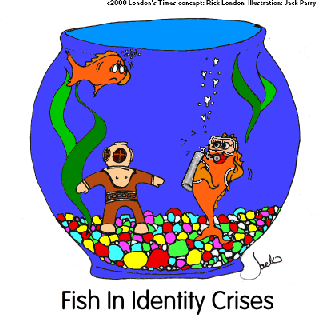 And it would be strange if the Orkuters don’t know anything about the country where they have lived for a pretty long time already, it should not be too hard to represent the country where they live.
And it would be strange if the Orkuters don’t know anything about the country where they have lived for a pretty long time already, it should not be too hard to represent the country where they live.
It’s interesting to see how people identify with different groups; which country and culture they consider to be their own. As U2 sings it in “Summer Rain”: “It’s not where you were born, it’s where you belong”. (And where your parents were born doesn't determine where you belong neither.) It would be great if we can help young immigrants - in this case in the Netherlands, France and UK - to encourage their feeling of belonging in Europe and to help them to find their way through education and on the labour market.
6/09/2006
The return of nuanced and non-polarized thinking
"Let's pray to the creator - whether it be God, Allah, Something or Completely Nothing - for the return of a nuanced and non-polarized way of thinking. In other words, thinking with your mind, not with your unconscious stomach sentiments, based on facts, not on prejudices. That is not to soothe or in denial of the reality, it is brave, constructive and realistic."
In Dutch:
"Laten we de Schepper - of het nu God, Allah, Iets of Helemaal niets is - op onze blote knieën smeken om de terugkeer van het genuanceerde en niet-polariserende denken. Oftewel: het denken uit de hersenen en niet uit de onderbuik, het denken gebaseerd op feiten en niet op vooroordelen. Dat is niet "sussend en ontkennend" (Bart Jan Spruyt) - dat is moedig, constructief en realistisch."
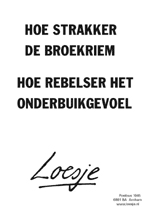
6/08/2006
Political correctness
Today I read in the paper that political correctness decreased very much in the Netherlands in the last years, especially with regard to how people talk about foreigners.
A research was carried out by Motivaction. It turned out that 10 percent of the Dutch openly admits to be racists. Another 17 percent says to be racist "every now and then".
Half of the population has got an antipathy towards Muslims. 41 percent of the respondents think that immigrants are intolerant, 24 percent think they are lazy and 36 percent that they are liars.
There was also a question where people could mention a population group with whom they feel the least at ease. 49% replied that they don't feel at ease among Moroccans, followed by Antillians, Turks and Africans with 35/32/32 percent.
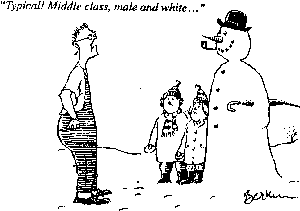 Probably people have always had these negative thoughts, but it is also possible that the percentages became higher after 9/11 and after Pim Fortuyn and Theo van Gogh were killed. But the main reason why the numbers are so extremely high now, is because "people finally dare to say what they think openly". Well, I must say that I prefer political correctness, then. You get a very aggressive, hostile and unliveable society when people start saying these things too easily. What would it be like for immigrants when people openly say to them that their group is lazy, intolerant and telling lies, and that they don't feel at ease in their surroundings?
Probably people have always had these negative thoughts, but it is also possible that the percentages became higher after 9/11 and after Pim Fortuyn and Theo van Gogh were killed. But the main reason why the numbers are so extremely high now, is because "people finally dare to say what they think openly". Well, I must say that I prefer political correctness, then. You get a very aggressive, hostile and unliveable society when people start saying these things too easily. What would it be like for immigrants when people openly say to them that their group is lazy, intolerant and telling lies, and that they don't feel at ease in their surroundings?It is really worrisome that it's becoming more and more accepted in the Netherlands to admit that you're a racist. You can openly say that you think that these people with darker hair and skin who come from other countries, that they are barbarians which you would not have to treat with the same amount of respect as you treat "the Dutch".
The information that somebody comes from Morocco is enough reason to openly say that you don't feel at ease with him or her around. That's terrible.
A small minority in the Moroccan population gives the whole group a bad image, and the image gets worse because the irrational fear among the Dutch for foreigners / Muslims has grown after 9/11 and the other attacks. It is very stupid to feel uncomfortable with the whole group in general while only a small part of that group is problematic.
The director of Forum, Institute for Multicultural Development, says in the newspaper article that this recognition and acceptance of racism forms an incredible obstacle for the search for a common future with the different groups which are living in the Netherlands.
***
And today (a few days later) I read in the newspaper that Verdonk thinks that Canada can learn a lot from her rusty immigration policies. During her visit to Canada she proudly claimed that Canada is still in the stage of political correctness, a stage which the Netherlands have left behind already. Fortunately John Ibbitson from the Canadian paper "The Globe and Mail" replied that Canada can learn nothing about immigration policies from Iron Rita. He spoke with her about the Netherlands and he said that Canada should never become like that.
Verdonk said that the political correctness in Canada would disappear immediately once Canada has been struck by a terrorist attack as well. Of course, when about four terrorists have committed an attack in Canada, that country can immediately let go of their national attitude of tolerance and hospitality towards foreigners who enter the country and towards foreigners who are living in the country. Very logical to treat the whole population of immigrants like that when very few have committed an attack...
Ibbitson said: if we would decide to close all the doors because of a terrorist attack, it means we are giving in to lunatics and racists.
6/01/2006
Liberal and Islamic values
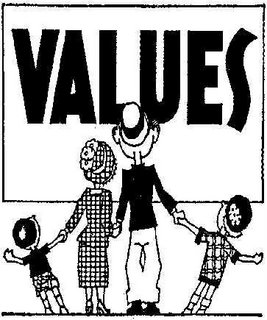 At Orkut somebody (Brent) asked me me how I can adhere to Islamic values if I'm a liberal. Below is my reaction, a presentation of the liberal and Islamic values that I adhere to...
At Orkut somebody (Brent) asked me me how I can adhere to Islamic values if I'm a liberal. Below is my reaction, a presentation of the liberal and Islamic values that I adhere to...Let’s start with the liberal values. Within liberal theories of toleration (source: “Toleration as Recognition” from Anna Elisabeta Galeotti) two main positions are possible: neutralist and perfectionist liberalism.
In the neutral liberal view, the idea is that one set of views should not be favored over others in the public sphere. It means that public action should discount all personal difference that are politically irrelevant (from ethnic origin to affiliations, religious beliefs, moral values, skin color, and sexual preferences). The idea of neutrality is meant to fulfill the liberal principles of equal liberty, non-discrimination, and impartiality by deciding that the state and political agencies have no business in trying to improve citizens according to any conception of what is valuable in life or how they should live.
By contrast, in the perfectionist liberal view, liberalism necessarily presupposes a conception of the human good, which is ethically substantive. This liberal conception is focused on the values of human rationality, autonomy, self-reliance and self-development. A major concern for perfectionist liberalism is to design a proper definition of the liberal good, which must be shown to be consistent with pluralism, with the minimum use of coercion and with the right of each individual to define his or her own good. According to perfectionists, liberal politics presupposes a certain kind of human character (autonomous, independent, self-reliant) and it is sustained by a corresponding set of substantive virtues and values, among which are tolerance, pluralism and diversity. Pluralism is a precondition for individuals to develop an autonomous personality and, hence, the toleration of diversity is a necessary constituent of a liberal society. Thus, for perfectionist liberalism, full potential toleration should in principle be limited to those differences which can be accommodated within the fairly open boundaries of the liberal conception of the good, while the differences which appear incompatible with liberalism are in principle excluded in order to preserve the liberal order and it’s ethical integrity.
I hope that the difference is clear between these two positions. Personally I support the perfectionist view, with a clear conception of the good, based on humanist values like tolerance, acceptance of differences, individual autonomy and universal human rights.
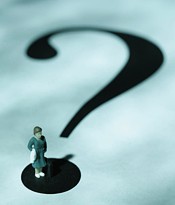 Some years ago I started to read about the Jewish philosopher Emmanuel Levinas, who writes about humanism / ethics. Not surprisingly, the core values in his philosophy are similar to (perfectionist) liberalism: tolerance, acceptance of differences, human rights, and anti-discrimination and anti-racism. According to Levinas, I am responsible for how I treat another person. I should help people who are in difficult situations, when they ask me for help. Especially vulnerable people who are e.g. poor, and the stranger, the widow and the orphan. People who don’t have enough to eat, or who have no home, or who have lost their partner or their parents; my focus should be on them, to help them. My responsibility to help them is infinitely, I should do as much as I can.
Some years ago I started to read about the Jewish philosopher Emmanuel Levinas, who writes about humanism / ethics. Not surprisingly, the core values in his philosophy are similar to (perfectionist) liberalism: tolerance, acceptance of differences, human rights, and anti-discrimination and anti-racism. According to Levinas, I am responsible for how I treat another person. I should help people who are in difficult situations, when they ask me for help. Especially vulnerable people who are e.g. poor, and the stranger, the widow and the orphan. People who don’t have enough to eat, or who have no home, or who have lost their partner or their parents; my focus should be on them, to help them. My responsibility to help them is infinitely, I should do as much as I can.I found it very beautiful to read these texts from Levinas.
And it was because of reading Levinas that religion came back to me, after it had been gone for a long time. According to Levinas, God is infinite, he is Infinite Goodness. This while human beings are not infinite at all, on the contrary; they are very limited in their goodness, power and how much they can understand. A limited being can never fully understand an infinite being. We cannot understand the incredible size of infinity, we can understand only a very small part of it, just as small as we are. Humans are locked up in their own minds, they can only think their own thoughts. We cannot break out of this isolated world ourselves.
The only person who can liberate me is “the other”, who makes an appeal to me by requesting a response from me. When I meet the other, our relation becomes ethical. Before, when I was alone, I could do whatever I liked, but now I have to take the other into account. I am responsible for how I treat him/her. At that moment behavior can be defined as either morally good or bad. The other liberates me by waking me up, he opens up the prison of my own thoughts by showing to me that there is more in the world out there than just my thoughts, infinitely more. There is more than just my own consciousness (there is the consciousness of the other, to start with), I am not located in the center of the universe, my selfishness is not acceptable. And by seeing a glimpse of the infinity outside my own mind, which I can see thanks to the liberation by the other, I can see a glimpse of God.
 In short (not very short) this is what I wanted to say about liberal values and the humanism of Levinas. Now, how is this linked to Islamic values?
In short (not very short) this is what I wanted to say about liberal values and the humanism of Levinas. Now, how is this linked to Islamic values?Some time ago I read an article from Fouad Laroui, a Moroccan writer (and scientist) in the Netherlands. I was thinking that he expressed the main idea of Levinas’ philosophy in that article, the idea that I should treat the other as a fully and equal human being, always, not as an object. I decided that I would like to talk to him and I sent him an e-mail at the university. We met in a café and he had also brought a friend with him, a Moroccan philosopher from France (Hamid Barrada). It was Barrada who sowed me the link between Levinas and the Islam. He said that Muslims also believe that there is only one God, who is infinite, and that you can see a glimpse of him through contact with fellow human beings. I started to read more about the Islam and I spoke with Muslim friends from Orkut in msn. I saw many similarities between what Levinas wrote and what I read about the Islam, e.g. also the emphasis on helping the poor.
So this is the part of the Islam that I am interested in, in values / virtues like tolerance, peace, solidarity, a community spirit, helping the poor, and to try your best to be a morally good person.
Brent, you can give me a description of what you consider to be common Islamic values, but it is doubtful if these “values” (what you described where more practices in certain situations than values) are really that common, and it doesn’t mean at all that I would have to accept the values you mentioned blindly. If you want to say that I am almost a Muslim, that’s correct, but then it means that I am a tolerant, moderate peaceful Muslim (5% missing) who adheres to liberal and humanist values.